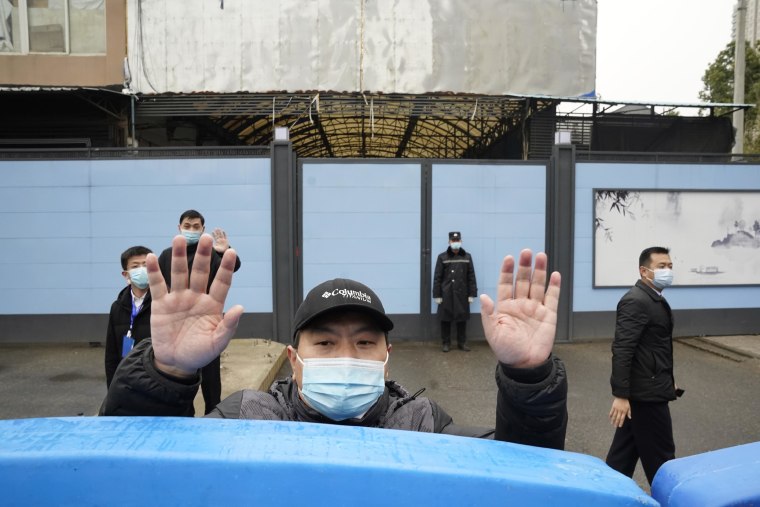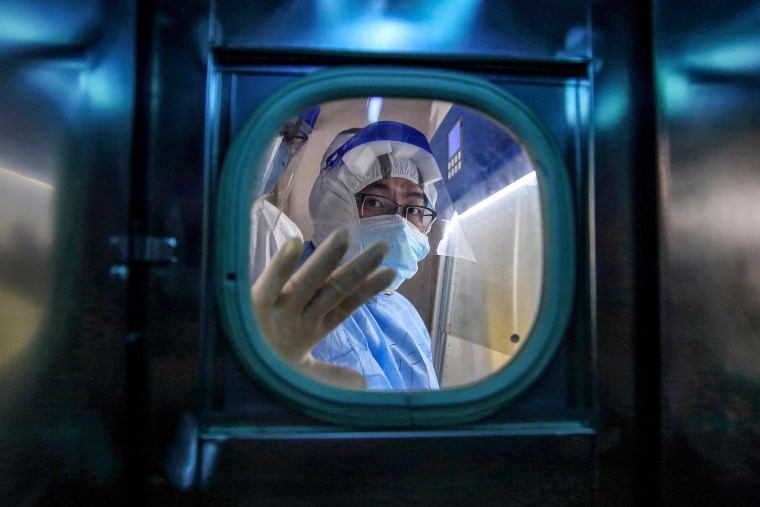The World Health Organization is recommending more investigation into the theory that Covid-19 leaked from a Chinese laboratory, something once dismissed by some as a conspiracy theory but since taken seriously by some experts and officials.
Thursday’s report marks a shift for the WHO. To investigate Covid’s origins it commissioned an international group of experts who, working alongside Chinese health officials, published a study in February 2021 saying the lab-leak theory was “extremely unlikely.”
But the report was controversial from the start, and WHO Director-General Tedros Adhanom Ghebreyesus told a news briefing three days later that nothing had been ruled out, and that “all hypotheses remain open and require further analysis.”
After months of criticism, Tedros said in July that it had been “premature” to rule out the idea because “I have worked in the lab, and lab accidents happen.”
On Friday, Beijing responded forcefully to the recent WHO report, and repeated its suggestion — without evidence — that the virus may have come from an American laboratory.
“The lab leak theory is totally a lie concocted by anti-China forces for political purposes, which has nothing to do with science,” foreign ministry spokesman Zhao Lijian told a daily press briefing. “We always supported and participated in science-based global virus tracing, but we firmly opposed any forms of political manipulation.”
He repeated calls for investigations into “highly suspicious laboratories such as Fort Detrick” in Maryland “and the University of North Carolina,” where China has suggested, again without evidence, that the United States was developing the coronavirus as a bioweapon. NBC News has contacted the Department of Defense and the University of North Carolina for a response.
The WHO's change of direction came Thursday in the first report by its Scientific Advisory Group for the Origins of Novel Pathogens, known as SAGO.
The group agreed that the now-infamous Wuhan seafood market likely “played an important role” early in the pandemic because a number of patients in December 2019 had links to that site.
However, there are still “gaps in our knowledge,” it said, specifically about how the virus got to the market and where the first “spillover” between animals and humans happened.
The report recommended “further investigations” into the idea this could have happened in a laboratory, as well as “all other” possible routes.
China has previously suggested that Covid could have been imported into its country in frozen food. Thursday’s WHO report said the “cold chain” theory should be investigated further, too.
NBC News tried to contact the information office of China's National Health Commission for comment Friday but was told the officials covering the issue had left for the day.
A lab leak was once seen as a fringe conspiracy theory, clouded by the mistaken belief that its supporters were suggesting that Covid had been intentionally released as a bioweapon. In fact, many of its exponents were postulating that the virus may have escaped from a lab, namely the Wuhan Institute of Virology, following an accident during virus tests. Thursday's report noted this was not only possible, but lab accidents in the past had triggered some outbreaks in the past.
Last year, President Joe Biden told U.S. spy agencies to compile a report looking into Covid's possible origins. At least one unnamed American intelligence agency believes it could have escaped from a lab but the community remains divided, the report said.

Dr. Jean-Claude Manuguerra, co-chair of the 27-member SAGO, said some scientists might be “allergic” to the idea but urged them to be “open-minded,” The Associated Press reported.
However, three members of the group did not agree that the lab leak theory should be investigated, including China's Professor Yun-Gui Yang and Russia's Dr. Vladimir Dedkov, the report said.
In the early months of the Covid pandemic, Tedros was accused of being too eager to please Chinese President Xi Jinping. In 2020, just as then-President Donald Trump announced that the U.S. would sever its relationship with WHO completely, China upped its funding of the organization by $30 million.
In addition, China was slow to release data and alert the world about the true extent and potential danger of the rapidly spreading virus.
More recently the Sino-WHO relationship has taken a hit, with Beijing censoring Tedros after he criticized its "zero-Covid" policy.
Jamie Metzl, who sits on a WHO advisory group unrelated to SAGO, told the AP that "the Chinese government is still refusing to share essential raw data and will not allow the necessary, full audit of the Wuhan labs."
In Washington, a Republican-led subcommittee in the House on the Covid pandemic tweeted, “Americans were smeared as ‘conspiracy theorists’ for asking whether #COVID19 came from a lab leak. Now, the WHO is asking the same questions.”
CLARIFICATION: (June 14, 2022 11:05 a.m. ET) This article has been updated to reflect comments by Director-General Tedros Adhanom Ghebreyesus, who said within days of the February report that the lab-leak theory still deserved investigation.

